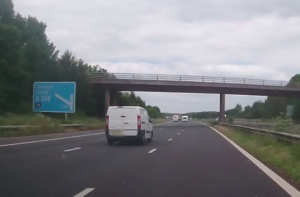By: Ed Evans, Director, Civil Engineering Contractors Association Wales
It’s been a strange few weeks.
We’ve gone from being social animals to socially distanced animals in a very short space of time.
No more trips to the pub, the coffee shop, the chapel. No schools open. Public transport systems largely reserved for key workers. And for many, the ones who are able to work, it’s all about homeworking – Skype, Zoom, Teams, etc. But, and I know this came as a shock to some of my friends
and acquaintances, lots of people are still having to travel to work to do that essential work that you can’t do from home. To farms, to factories, to hospitals, to supermarkets and, of course, to construction sites. To do the things that we need to survive and stay safe.
But, across Wales, our attention is, quite rightly, focused on our frontline NHS and social care workers, who are doing an incredibly brave job under extremely difficult conditions. We’ve all seen the heartbreaking stories of loss but also the heroic stories of what people are doing to care for
others. The reality though, is that for them to keep us safe they need, as we all do, resilient infrastructure.
Both the Welsh and UK governments have stated, from the outset of the lockdown, that construction works should continue, as long as it is safe to do so. Throughout this crisis our infrastructure workers have been working hard, behind the scenes, keeping our infrastructure working: keeping our transport systems moving, our water systems safe and operational, keeping
the power on and our communication systems up and running. Many contractors have continued to operate despite considerable difficulties and costs. This is in the face of increasing difficulties in
sourcing materials, the need to reassure workers and often responding to hostile reactions from the public who were, and maybe still are, unclear as to why construction works were continuing despite
restrictions on their own lives.
Throughout the crisis, civil engineers have kept working diligently, safely, and on targeted projects. To press on with road and rail improvements while demand has been low, so we emerge from these
challenging times ahead of schedule. Many, they had been ramping up their operations to undertake emergency flood defence works following the storms of February and March (remember Storm
Denis and Ciara?). And perhaps most importantly we’ve been vital in building the temporary field hospitals and converting buildings from the Principality Stadium to Parc y Scarlets, while also helping get the new hospital for Gwent, Llanfrechfa, open a year ahead of schedule.
It’s fair to say that the initial response to the lockdown was chaotic to say the least, as it was in many sectors. Disbelief was compounded by confusing mixed messages which led to the premature closure of many sites and temporary “laying off” of workers. And then after the immediate chaos,
things slipped into “the new norm”. Once it became clearer what business and employment support was available, we started to develop “safe operating procedures” for businesses to continue working
safely. The Welsh Government and Public Health Wales played their part in developing regulations on social distancing which reassured workers that “reasonable measures” were in place to support workers and businesses. Throughout this crisis infrastructure businesses, many of them SMEs, have followed the instructions of the Welsh and UK Governments in continuing to deliver construction works wherever and whenever it is safe to do so. These actions are helping the infrastructure sector to continue to operate safely to keep our infrastructure resilient. However, these businesses are
facing extremely difficult and worrying times of their own which could lead to many of them going out of business resulting in the loss of jobs and opportunities in some of our most deprived areas.
The more of these businesses that fail to survive, the less able we will be to recover from this crisis and the less able that local authorities and other infrastructure clients will be able to keep their local infrastructure as resilient as possible.
But what of the future? Understandably, the efforts of most people are going in to dealing with the “here and now” of this pandemic and it feels almost disrespectful to be talking about how we pull through this crisis economically. Especially when people are continuing to contract the virus, with people still dying and with frontline workers struggling to cope in difficult circumstances.
But thinking to the future is exactly what we need to do. Our health and social recovery goes hand in hand with our economic recovery. We do need to plan ahead to ensure that our infrastructure is operating smoothly for when we emerge and recover from this crisis. And we need to do that now.
We need to restart works safely. We need to get workers back into work safely. And we need to get our economy restarted safely so that we see no re-emergence of the virus. And as much as we need the physical infrastructure, given that the sector itself represents about 10% of our GVA (gross value added) and employs thousands across Wales, we need to get all companies up and running again, safely.
Much of the sector is made up of SMEs which are critical to our foundation economy. They are facing extremely difficult and worrying times with limited or no cashflow which could lead to many of them going out of business without a clear indication of what work lies ahead. This will mean the loss of jobs and opportunities in some of our most deprived areas. The public sector, and the Welsh Government and local authorities in particular, are major customers for infrastructure services so
there is much that they can do to support this sector during these difficult times by focusing on continuity of workload and cashflow for supply chains.
With this in mind the need for collaboration across public and private sectors couldn’t be greater.
We all need to be working together and supporting each other. A clear message from the public sector would generate the confidence that businesses need to get going again, including the quarries and builders merchants who supply the sector, to support the Welsh and UK government’s calls to maintain the resilience of our infrastructure as we emerge from this crisis.
The infrastructure sector has been working hard behind the scenes to keep our infrastructure resilient during this crisis but, as we start to look towards the future, the infrastructure sector will be essential to our recovery as a nation.
























